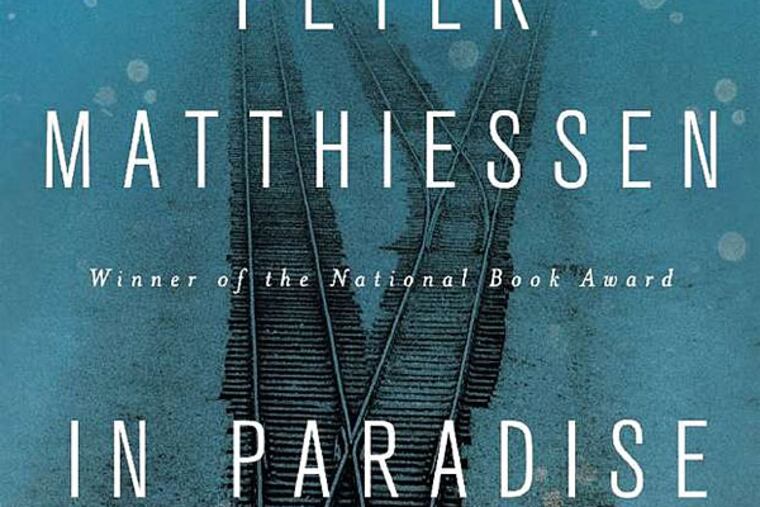Matthiessen's last leaves a void
Throughout his prestigious career, which included winning two National Book Awards, Peter Matthiessen, who died on April 5 at the age of 86, often relied on his travel experiences to inspire both his fiction and nonfiction. In Paradise is no exception.

In Paradise
By Peter Matthiessen
Riverhead. 246 pp. $27.95
nolead ends nolead begins
Reviewed by Kevin Grauke
Throughout his prestigious career, which included winning two National Book Awards, Peter Matthiessen, who died on April 5 at the age of 86, often relied on his travel experiences to inspire both his fiction and nonfiction. In Paradise is no exception.
Having participated in three Zen retreats at Auschwitz-Birkenau, the Nazi extermination camp in Poland, Matthiessen set this novel among a group of people of various faiths and nationalities who have come to the remains of the camp in 1996 "to bear witness lest the world forget man's depthless capacity for evil."
Although not officially enrolled in this spiritual retreat, the protagonist of the novel, Dr. D. Clements Olin, a Polish-born American non-Jew, has attached himself to this group in order to research the role of death camps in the work of the Polish writer Tadeusz Borowski. He also happens to have a more personal reason for coming, though he is just as reluctant to share this reason with us, the readers of his thoughts, as he is with the people he encounters on this retreat.
Despite the restorative purpose of this ecumenical gathering, simple ceremonies ignite tensions, and thoughtful discussions transform into heated arguments about a number of thorny topics, including residual German guilt, the guilt felt by Jewish survivors, the nature of evil, Polish collaboration in the atrocities, the culpability of the Catholic Church, and the very relevance of bearing witness 50 years later. While these sections of the novel are often intellectually engaging, just as any contentious debate among dissenting authorities tends to be, their static nature inevitably dulls the senses, especially since Olin mostly remains uninvolved in the quarrels; with very little reaction or internal commentary, he merely listens to seemingly dozens of relatively faceless characters going at each other.
After a significant portion of the novel's first half has dedicated itself to these factious encounters, In Paradise does eventually turn more of its attention toward Olin and his inner life. Gradually, after a bit too much of the narrator's intentionally vague teasing, we learn of his family's historic connection to the region, and explore his complicated reactions to both what he discovers and whom he meets, most importantly Sister Catherine, a Catholic novice to whom he finds himself attracted.
Matthiessen said that, "as a non-Jewish American journalist," he felt that he was "unqualified" and "had no right" to write about his own experiences at Auschwitz. He believed that writing a novel, however, granted him the freedom "to probe from a variety of viewpoints the great strangeness" he had felt there. While this reticence is understandable, In Paradise (the title comes from a reference to different versions of a remark made by Jesus on the cross) suffers in comparison to what might have been.
Rather than truly exploring this "great strangeness," Matthiessen feels it necessary to create novelistic storylines for Olin, namely his search for the truth of his family's past, as well as his intensifying relationship with Sister Catherine. Each is engaging in its own fashion (the former more so than the latter); however, neither is as compelling as the moments when Olin is simply allowed to contemplate the layers of Auschwitz's meanings, both past and present.
For instance, in one of the novel's most striking sections, after one of the nightly sessions of bearing witness to each other, several members of the group spontaneously begin dancing, much to the disgust and bewilderment of the others. Olin, who joins in, ponders for several pages the incongruous beauty of this scene: "What had struck him . . . as a sentimental self-indulgence that ordinarily he would have fled after the first round - a death camp prance of grinning fools as in some lugubrious danse macabre of the Dark Ages, enacting mankind's insignificance in the shadow of the scythe - has metamorphosed into gentle rejoicing, transcending the atmosphere of grief and banishing lamentation from the hall."
Throughout the novel, we hear such thoughtful meditations, but not nearly enough. Instead, too much of In Paradise is dedicated to prosaic plotlines and representative voices that we might be content to receive from the pen of a lesser literary figure.
But we want more of what we know Matthiessen can give us - a vital thoughtfulness enlivened by a lifetime of personal and political examinations - especially on such a weighty subject as this.
And now that we've lost Matthiessen, we know that we'll never receive what we might have, which only makes this novel that much more disappointing.